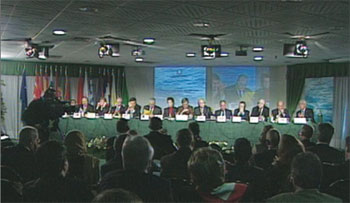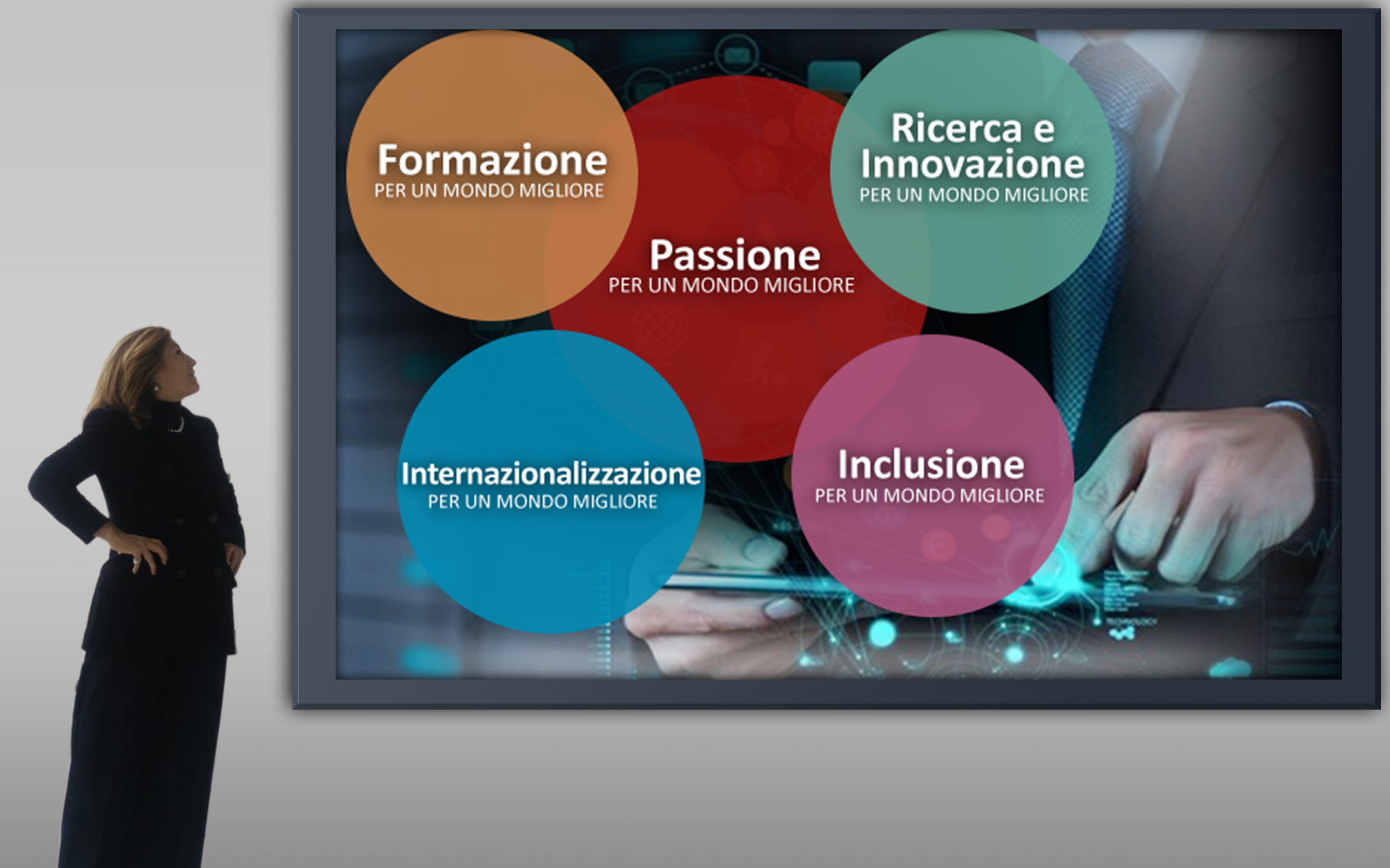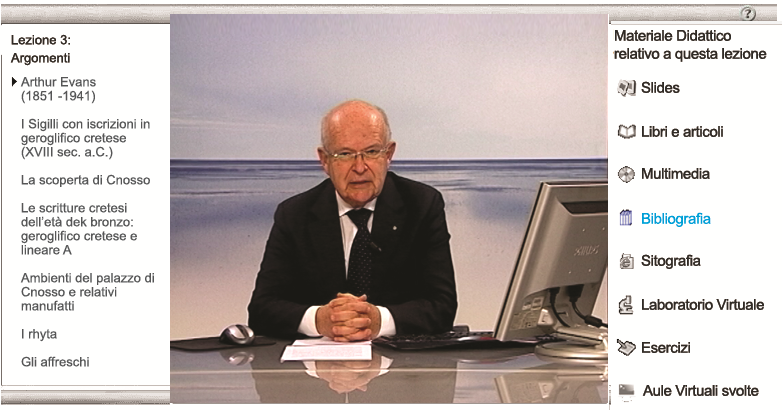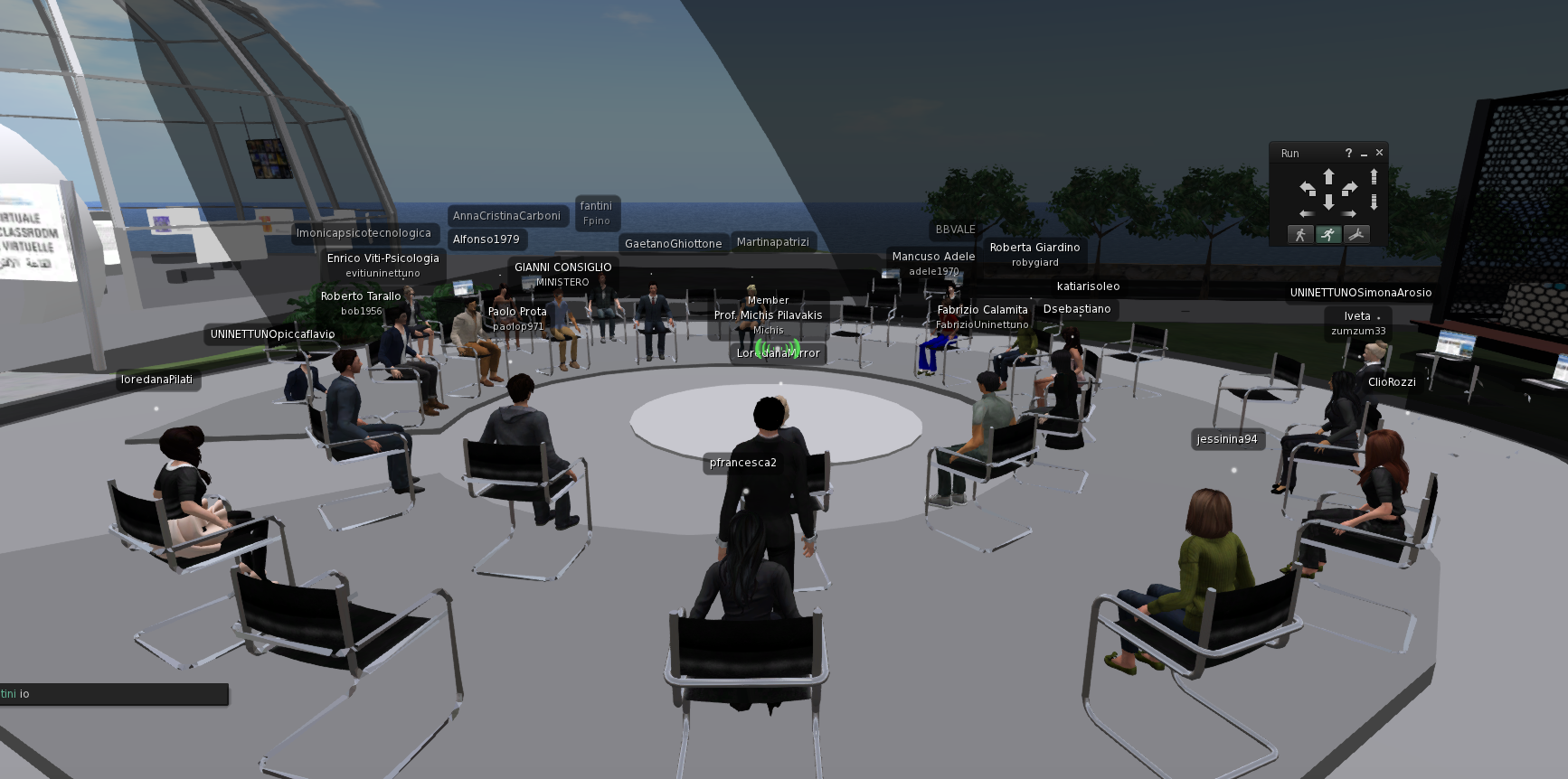The International Telematic University UNINETTUNO, established by the decree of the 15th April 2005 of the Italian Ministry of Education, University and Research, delivers academic titles having a legal value in Italy, Europe and in the Mediterranean Countries, for first-cycle (bachelor) degrees, specialization degrees, specialization degrees , doctor’s degrees and master's degrees. In the International Telematic University UNINETTUNO distinguished lecturers of important universities worldwide deliver their courses in the Internet-based real and virtual spaces in Italian, Arabic, English and French.
UA dream that has come true: With the UNINETTUNO, you can attend your University from anywhere you are with no more limits of space and time.
History

UNINETTUNO takes origin from the training model of NETTUNO - Network per l’Università Ovunque, a consortium of 43 Italian and foreign universities with which, since 1992, thousands of Italian and foreign students obtained a distance university degree thanks to television and the Internet. At present, many of these universities put at UNINETTUNO’s disposal physical facilities such as laboratories for conducting research work and training activities, libraries, halls equipped with PCs and classrooms to organize face-to-face exams sessions for the students. UNINETTUNO takes origin also from the international success of MedNet'U (Mediterranean Network of Universities) Project, funded by the European Commission in the framework of the EUMEDIS Program, aimed at realizing a Euro-Mediterranean Distance University. With Med Net’U it was established a network of 31 universities of 11 countries of the Euro-Mediterranean Area (Algeria, Egypt, France, Jordan, Greece, Italy, Lebanon, Morocco, Syria, Tunisia and Turkey). The development of Med Net’U from project to system was supported by the Governments of the partner countries.
Actually, on the 29th January 2006, in the framework of the Catania 3 Conference for the realization of a “Euro-Mediterranean Area of Higher Education and Research”, 14 Ministers of Higher Education of several Mediterranean countries, undersigned a joint declaration by which they stated their goal of strengthening the distance learning system of the Mediterranean countries, by expanding the results attained through the Med Net’U Project.
The strength and the process of growth of UNINETTUNO are unquestionably represented by the fact that it rapidly succeeded in acquiring a significant role at international level by concluding agreements with the countries of Europe, the United States, Latin America, China, Russia, Georgia and Iraq. Very important agreements were undersigned with countries of the Mediterranean area, in particular with Egypt, Morocco, Syria and Tunisia.
The International Telematic University UNINETTUNO is a great university in which prestigious lecturers from different universities of the world realized a unique international pole of knowledge
UNINETTUNO students can attend the university with no limits of space and time. Actually, with UNINETTUNO, teaching and learning spaces are no longer only lectures halls, but also open spaces, museums, cultural centers, workplaces, students’ homes, cybercafés. Anywhere in the world, you can choose whether to study in Italian, Arabic, English, French and Greek, on television and on the Internet, and earn a study title acknowledged in Italy, in Europe and in some Mediterranean countries.

A dream come true: wherever you are, with no limits of space and time, you can attend the University
The success of UNINETTUNO organizational, psycho-pedagogic and educational model is recognized at international level.
Training, Research and Innovation, Internationalization, Inclusion, Passion:
These are the five principles that have always inspired all those engaged in enhancing the UNINETTUNO University’s model; all together, we realized a laboratory for cross-cultural and cross-language cooperation that has actually democratized the access to knowledge.

A revolution in the teaching and learning model. With www.uninettunouniversity.net an open space for exchange and interrelation among cultures

The distance education delivered by UNINETTUNO takes into account the educational needs of the technological society around us, of the evolution and development of the information technology, of the results of psycho-pedagogic research connected with them. In particular, UNINETTUNOs’ psycho-pedagogic and educational model was born from the results of many international research programs, under the supervision of Prof. Maria Amata Garito and of her research team.
This model is based on cognitive and connectionist theories and concretizes the shift:
- • From teacher’s central role to the student’s central role;
- • From knowledge transfer to knowledge creation;
- • From a passive and competitive learning to an active and collaborative learning.
The student is at the center of the training path, guided by the new profile of the telematic professor-tutor who has the task of supplying the tools that can facilitate his web-based learning and communication path. The whole teaching and learning process takes place on the Internet. On the portal on www.uninettunouniversity.net there is a dedicated area: the Didactic Cyberspace. The Internet-based learning environment transfers directly to the student’s desk lessons, multimedia products, databases, exercises, evaluation and self-evaluation systems, online tutoring, forums, interactive classrooms, thematic wikis.
Videolessons:
The digitised videolessons are the starting-point of the learning process. Each videolesson is structured on different issues and indexed in order to give the student the possibility to follow the entire videolesson or to select the issue he wants to study more in depth. Each issue is linked, in a hypertextual way, to essays, books, texts of exercises, virtual laboratories, selected bibliographies, webographies.

LVirtual lab:
It is an environment, in which the student integrates theory with practice by a “learning by doing” process.
Online exercises:
This section includes online interactive exercises linked to the issues treated in the videolessons.
Online tutoring /Interactive classroom:

Online tutoring is organized in classes of 20 or 30 students, with an advanced system of Agenda that is able to acknowledge the single user and customize the training activity.
The tutoring activities take place:
- In a synchronic mode by means of the interactive classroom, implemented in the Didactic Cyberspace, but also in the three-dimension classroom set up on UNINETTUNO’s Island of Knowledge on Second Life;
- In a diachronic way by means of forums, wikis and social networks.
The Interactive Classroom is an environment where direct interaction between teachers, tutors and students takes place, where knowledge is shared. In this learning environment interactive, practice exercises, mid-term assessment tests take place; dialogue and learning take place in a cooperative a collaborative way. In the interactive classrooms, a new pedagogic model becomes a concrete fact: the Flipped Classrooms. The students are encouraged by the professors-tutors to become active constructors of knowledge. Among the technological innovations on which the teaching activity can rely, UNINETTUNO realized a true Island of Knowledge on Second Life, where the students’ avatars and the professors/tutors’ avatars can interact by their own voice in a three-dimensional virtual world. On Second Life, virtual leaning communities are set up.
“In these virtual spaces intelligences get connected to each other, expertise is exchanged, knowledge is developed. The cultures and ideas of professors, tutors and students of different countries of the world confront each other in continuous stream of interrelations.” (M.A.Garito)

Innovation in Education
Innovation characterizes also the curricula and contents of the disciplines related to the various degree courses. Recently, UNINETTUNO innovated all its degree courses and implemented new three-year, second-cycle and master’s courses related to issues connected with technological innovation and industry 4.0, as proved by its educational offer.

Educational Offer
31 Degree Courses related to 6 Faculties aimed at developing skills linked to technological innovations and to the needs of the new labor markets. To know more about our educational offer click
here
UNINETTUNO’s Strength
Innovation, Research and Experimentation
Innovation, research and experimentation are at the basis of the UNINETTUNO model: the present that anticipates the future
The research activity of the International Telematic University UNINETTUNO is structured in “University Research”, focused on technologies and methodologies related to distance teaching and learning processes and in “Faculty research activities”, more linked to the specific interests of each degree course.
The former one involves international-level experts in different disciplines (technologists, computer scientists, pedagogues, learning psychologists, experts in various languages and in communication). Actually, the interdisciplinary results obtained can be tracked down in different areas: technical-engineering, psycho-cognitive, pedagogical, socio-cultural, methodological-organization ones and allowed to identify new modes for realizing both face-to-face and distance teaching-learning processes. These results have already had a significant impact on the theories related to learning processes, teaching methodologies. In addition, they represented the starting point of the evolution of the psycho-pedagogic and educational model that led to the realization of the new distance teaching and learning model and of the e-learning model applied by UNINETTUNO and recognized by the international scientific community.
Among the varied issues in which the University’s research teams are working there are: artificial intelligence, machine learning, mixed reality, augmented reality. The aim is that of developing new models of videolessons, of interaction between students and teachers and three-dimensional virtual laboratories.
With regard to the research activities of the single faculties, there are several projects going on, which see the collaboration with various universities and scholars around the world. Research laboratories integrated into the UNINETTUNO’s technological platform allow UNINETTUNO’s researchers to establish network-based connections with other research laboratories from different countries (e.g. China and Japan) and with universities all over the world, giving these researchers the possibility to exchange data, standardize research protocols and share materials, equipment, and laboratories. Among the varied issues in which the University’s research teams are working there are: artificial intelligence, machine learning, mixed reality, augmented reality. The aim is that of developing new models of videolessons, of interaction between students and teachers and three-dimensional virtual laboratories.
With regard to the research activities of the single faculties, there are several projects going on, which see the collaboration with various universities and scholars around the world. Research laboratories integrated into the UNINETTUNO’s technological platform allow UNINETTUNO’s researchers to establish network-based connections with other research laboratories from different countries (e.g. China and Japan) and with universities all over the world, giving these researchers the possibility to exchange data, standardize research protocols and share materials, equipment, and laboratories.
As it regards, instead, humanities, the researchers have at their disposal, on the Web, the library collections of many libraries throughout the world. Digitization allowed to create and update library catalogues that otherwise would be only physically accessible in the libraries and research centers.
The Engineering Faculty is carrying out research work on cosmic rays, on the Earth observation to study earthquakes precursors, on the ionosphere and on many other topics. There many scientific partnerships: international universities and research centers such as Riken (Japan), NASA, the Chinese Space Agency, the Italian Space Agency, INFN, INGV, INAF and many others. Studies on nuclear fusion are carried on in cooperation with the M.I.T. in Boston. Other inter-faculty research works deal with cloud computing, the Internet of Things, business 4.0, digital economy, questions related to law in the digital society, cybersecurity, digital cultural heritages, Internet and technologies addiction etc.
Internationalization, the Value of a University without Boundaries
UNINETTUNO has always made of internationalization one of its main strategic pillars and today, with its students coming from 167 countries across the world, it really is a global university without boundaries.
UNINETTUNO’s internationalization process was developed and continues to develop based on two different models: the first one is characterized by the spreading of the Internet. Anybody, without leaving home, can choose the educational path that best meets his own needs and, then, thanks to the Web, he can suggest and recommend it to his social network. It is through this spontaneous mechanism of global networked word of mouth, not controllable from above, that, in a few years, UNINETTUNO succeed in having enrolled students coming from the entire world. Tthe second model of internationalization, instead, is the result partnerships with the universities and ministries of many countries in the world, aimed at creating, harmonizing and sharing curricula.
Actually, all UNINETTUNO’s degree courses follow the European Qualification Standards: this process of harmonization of the study programs to international standards ensures the recognition of the delivered qualifications at European level and allow the students to earn a title that is acknowledged in their country of origin, in Italy and Europe and in some countries of the Arab World.
Presently, UNINETTUNO has 257 agreements, on the whole, with universities of the entire world. Some examples: Argentina, Azerbai¬jan, China, Colombia, Ghana, Japan, Guatemala, Hong Kong (China), Mongolia, Mo¬zambique, Nicaragua, Norway, Russia, Senegal, Singa¬pore, United States of America, Vietnam, beside the most important countries of the Arab World and of the European Union. “According to our University – the Rector, Maria Amata Garito, says - dialogue among cultures is not a utopia: the experience gained confirms that it is possible to share curricula and create, jointly with universities of countries having different political and cultural backgrounds, common paths for reflection and thinking.”
UNINETTUNO students come from 167 countries of the world. 105 National and International Technological Poles spread out at global level
The University as a tool for inclusion: the University for Refugees
UNINETTUNO realized the Internet-based portal, the “University for Refugees – Education without Boundaries”, allowing refugees and migrants to access the UNINETTUNO University for free from anywhere in the world.
“We are developing a big laboratory for true integration and for enhancing good immigration, dialogue, the peaceful coexistence among peoples and the struggle against terrorism. Only this way, us and them, we believe we can develop a future of peace.” (M. A. Garito)
Democratizing the access to knowledge is at the basis of every UNINETTUNO’S activity.
A concrete example: “I Learn Arabic – The Treasure of the Letters”
In the latest years, research work on television languages enabled to identify new languages and new methodologies for teaching Arabic on television to the illiterate adult people of Morocco. The outcomes of this research work enabled to realize the televised course, “I Learn Arabic – The treasure of the Letters” that is broadcast on the Moroccan national television, including 150 videolessons, available also in DVD format, linked to the new models of books aimed at teaching how to read and write.
“The method that was adopted, for the first time, enables to teach the Arab language as communication functional language. The teaching is put into a context: letters, words and grammar structure are constantly linked to objects and behaviors of everyday life of a typical Moroccan family. On Second Life, on UNINETTUNO Island of Knowledge, the Moroccan house becomes a three-dimensional scenario: the theatre in which for the first time avatars become actors, create the tale, they represent, in a concrete way, an event, an experience, a link between sound and image, providing the tools to enhance audio and visual memory and to remember the letters”. (M.A.Garito)